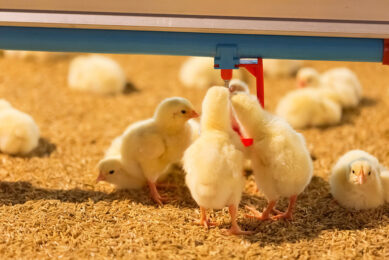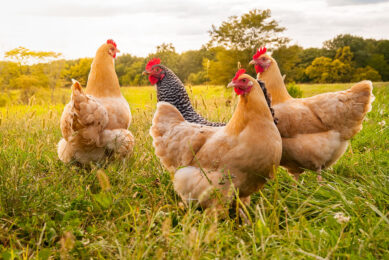Tackling piglet demedication with confidence

The phasing out of therapeutic use of zinc oxide in piglet feeds is top of mind in Europe and antibiotic reduction is more pressing than ever. To meet these challenges, pig producers have to consider a full approach to pull through and maintain high level of performance.
“We have been fortunate that we were not allowed to use a high level of zinc oxide in piglet feeds for over 2 decades in our domestic market. This situation in France has led us to build alternative solutions to manage digestive security around weaning. Also, we have gained experience in the field, driven by the need to comply with the antibiotic reduction plans,” says Vincent Bégos, piglet nutritionist of CCPA Group.
Taking advantage of it’s years of experience, the CCPA Group offers a total approach to succeed in demedication of piglet feeds.
This strategy relies on 3 main pillars:
- The feed formulation and nutritional expertise is a fundamental basis to provide a secured and high-quality complete feed.
- Special attention is given to support a safe digestive process by the use the Immax feed solution.
- Farm management practices, including biosecurity or sanitary status, are checked and improved if needed to move confidently towards the reduction of antibiotics and the withdrawal of zinc oxide.
In this regard, the CCPA Group has developed Demeus as a practical tool for the nutritionist in the field. This strategy covers the process from the feed up to the farm in the demedication context.
Ingredients for success
CCPA Group has started to offer a non-medicated piglet feed range more than 10 years ago and this Axecla line has now become its major products. One of the key features of this feed range is a reduced protein content without compromising growth performance, made possible by particular choices of protein sources. This antibiotic-free line also benefits from advanced knowledge and analytical resources of feed components. As the piglet digestive tract is a maturing and challenged system, it requires careful attention with proper raw materials qualification and selection. This also implies a constant quality control. For this purpose, the group leans on its internal laboratory. Over time, the CCPA group has gather a thorough knowledge on raw materials quality, on protein, energy and dairy-based sources and about the different processes applied on raw materials. On top of that, extensive trials in its experimental farm support these findings. To better assess the impact of ingredients on piglet digestive physiology, specific laboratory analyses are used and translated in feed formulation criteria. In particular, the acid binding capacity and cooking rate of starch sources are regularly analysed to give precision in feed designs and optimisations.

Securing the digestive process
Thanks to its research expertise in nutrition and health, CCPA has created a new feed solution to secure the piglet digestive process. Based on trials in its experimental farm and in commercial farms, the complete solution Immax combines plant extracts and a prebiotic source with 3 actions.
- The first mode of action sees the selected flavonoids sources (Scutellaria Baïcalensis, Curcuma and Green Tea extracts) acts as cellular protectors with positive effects on integrity of intestinal epithelial cells. This contributes to strengthen barrier function and helps nutrient absorption. “Now, weaned piglets also benefit from the properties of Scutellaria Baïcalensis, a natural solution patented by CCPA Group, after several years of proven use to protect mammary cells for milk-producing animals,” Vincent Bégos highlights.
- A second positive effect of the plant sources are their anti-secretory activities. The company has extensive knowledge of inducing anti-secretory factor by the inclusion of SPC Wheat, a specific raw material used in its creep and pre-starter feeds ranges. This factor limits water and ion losses from the gut and results in reducing the risk of diarrhoea. The selected plant extracts also have a similar capacity to inhibit the activation of chloride channels of the gut mucosa and thus prevent high secretion of water in the lumen.
- Finally, the new solution interacts with gut microbiota, influencing proliferation of beneficial bacteria. The prebiotic effect of sodium gluconate gives the advantages to Bifidobacteria and Lactobacilli. This action is also positive for gut epithelium through increased acetic and butyric acids concentrations.
Support demedication in the farm
“As our field trials have proven to us secured and high-grade antibiotic-free feeds will really deliver their full potential if used in optimal breeding conditions. A thorough and tailored assessment of the farm readiness for demedication is a key-point of success. To allow that, we have developed our expert app. Demeus,” states Anne-Sophie Valable, piglet nutritionist of CCPA Group. Demeus is a mobile application designed to support pig farm nutritionists to drive demedication strategies in post-weaning. Based on a quick and precise questionnaire focussing on key farm management features, the app quickly draws a clear picture of the farm situation, highlights the strengths and improvement leads. Then, it provides personalised advice on the adapted nutrition to maintain performance and health without in-feed antibiotics.
In addition to the scientific literature and its field-savvy experience, the tool is based on the CCPA Group participation in the European project ProHealth. The project’s aim was to synthesise strategies to reduce the impact of production diseases on farms and assess the efficacy of improvement strategies in reducing disease prevalence or severity. This work has highlighted the importance of specific farm management practices to succeed with non-medicated feed from 6 main key topics:
- External biosecurity
- Internal biosecurity
- Sanitary status
- Housing management
- Water management
- The farmer profile
Thanks to this work, a survey was built to assess the farm management. In addition, more than 30 European experts (nutritionists and veterinarians) working for feed manufacturers and national institutes were solicited on the relative importance of the questions for demedication success. And as a bonus for the nutritionist, an efficient and practical tool is available to ensure the success of antibiotic-free feeds thanks to optimal breeding conditions.
Author:
Swine Department, CCPA Group
 Beheer
Beheer





 WP Admin
WP Admin  Bewerk bericht
Bewerk bericht